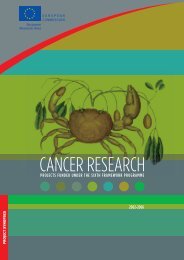I527-290 ESRIF Final Report (WEB).indd - European Commission
I527-290 ESRIF Final Report (WEB).indd - European Commission
I527-290 ESRIF Final Report (WEB).indd - European Commission
Create successful ePaper yourself
Turn your PDF publications into a flip-book with our unique Google optimized e-Paper software.
6. Another research area focuses on communicative strategies-what media actors might accomplish and how they can achieve<br />
their desired objectives in the most eff ective of manners. This focus has to do with communicative fl ows between the media<br />
and other key actors involved in crisis management and confl ict resolutions. However, research in this tradition tends to ignore<br />
the framing power of the media and the way in which the media enable or disable actors’ capacity for communication. For our<br />
purposes, it should thus be noted that, especially the political crisis communication literature has made an important contribution<br />
in addressing the link between crisis communication and political processes such as accountability and policy processes following<br />
in the wake of crises. However, by asking research questions related to the eff ectiveness of crisis management, this kind of research<br />
lose sight of the more long term societal implications of crisis which might have benefi tted from an open and critical discussion.<br />
7. There is a tendency in previous research on journalism to understand news organisations as a homogenous set of<br />
organisations with identical norms, values and practices. However, the few comparative studies that have been done on<br />
news organisational production practices demonstrate that there are in fact important diff erences between organisational<br />
practices which impact on how events are being covered. By focusing research on the organisational level, knowledge will be<br />
gained that can help us understand diff erences between news organisations both on a national as well as international level.<br />
This kind of research will also provide knowledge on whether there is empirical evidence for an increasing homogenisation<br />
of news as has been proposed by the notion of global risk society.<br />
8. As many journalists argue, reportage and comment must often go beyond the task of simply informing but also entertain<br />
audiences amid tight competition between media outlets for market share. Public bodies are obliged, therefore, to devise<br />
ways by which emergency information can be eff ectively transmitted, even in highly stressful settings, via media with<br />
diff ering production and business requirements, content styles and audience profi les.<br />
As these strategies are developed and implemented extensive research is required, in parallel, to identify the impacts which<br />
they may have on the eff ectiveness of security plans and procedures. The core concern rests with how public bodies can<br />
facilitate transparency and vigorous media scrutiny of crisis measures while ensuring that emergency measures do not,<br />
however unwittingly, become led by media demands and opinions rather than by expert-identifi ed need.<br />
Research on the impacts of intense media coverage or the expectation of such coverage on how emergency agencies plan for or manage<br />
a crisis is, therefore, a high priority in the interests of eff ective emergency management, rigorous journalism and public confi dence.<br />
This research should translate into practical pathways for public bodies and media practitioners to assist them through the<br />
complexities of communicating and reporting crises without placing the public at unnecessary risk.<br />
Collaborations among practitioners and academics which combine expertise in journalism/media studies and psychology should<br />
address how varied audiences respond to emergency information and coverage of crises. This research should bring forward best<br />
practices for public bodies and media outlets in the framing and dissemination of information in the interests of public safety.<br />
One should also investigate how the experience/expectation of media coverage impacts on public bodies and, especially, on those<br />
charged with devising plans for and managing emergencies. It will identify guidelines to help ensure that public bodies, in engaging<br />
with the media, both facilitate transparency and deliver eff ective public safety measures. Likely expertise will come from practitioners<br />
and academics in the fi elds of security, media, ethics, politics, psychology and law. Research must refl ect the changing landscape of<br />
media and, in particular, address and provide best practice strategies which refl ect the increasing shift to novel media technologies.<br />
Possible innovative routes of enquiry include:<br />
1. Whether media scrutiny prompts public bodies to quality audit their emergency planning and crisis management and<br />
whether this assists in striking an appropriate balance between societal security and other basic values?<br />
2. What legal, ethical and security issues arise when public bodies distinguish between information which, by its communication<br />
via the media, bolsters public safety and on the other hand information which is withheld so as to preserve security? What<br />
procedures, if any, can balance transparency and the avoidance of unnecessary risk while preventing abuses of power?<br />
235

















